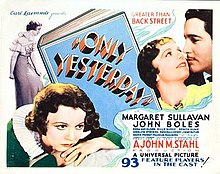Only Yesterday (1933 film)
| Only Yesterday | |
|---|---|
 lobby card | |
| Directed by | John M. Stahl |
| Written by | William Hurlbut George O'Neil Arthur Richman |
| Produced by | Carl Laemmle Jr. |
| Starring | Margaret Sullavan John Boles |
| Cinematography | Merritt B. Gerstad |
| Edited by | Milton Carruth |
| Distributed by | Universal Pictures |
Release date |
|
Running time | 105 minutes |
| Country | United States |
| Language | English |
Only Yesterday is a 1933 American pre-Code drama film about a young woman who becomes pregnant by her boyfriend before he rushes off to fight in World War I. It stars Margaret Sullavan (in her film debut) and John Boles.
According to the on-screen credit, the film's story line was "suggested" by the 1931 nonfiction bestseller Only Yesterday by Frederick Lewis Allen,[1] who had sold Universal the rights to his book.[2] The film is set in a time frame close to that of Allen's book but otherwise bears no resemblance to it, and the film's title may simply have been an attempt to capitalize on the book's fame at the time of the film's release. The plot of the film appears to be based closely on Letter from an Unknown Woman (Briefe einer unbekannten) by Stefan Zweig,[3] first published in 1922 and in English translation a decade later.[4]
According to the New York Times, some moviegoers contacted Zweig's publisher, Viking Press, noting similarities between the film and his book. The Times reported that "These similarities were bought and paid for by Universal Pictures", which moved the story to the United States, "altered the story greatly, and made no mention of Zweig's name in the film". The studio also paid "a large sum" for the right to use the title of Allen's book.[5]
Cast
- Margaret Sullavan as Mary Lane
- John Boles as James Stanton Emerson
- Edna May Oliver as Leona
- Billie Burke as Julia Warren
- Benita Hume as Phyllis Emerson
- Reginald Denny as Bob
- George Meeker as Dave Reynolds
- Jimmy Butler as Jim Jr., Mary's son
- Noel Francis as Letitia
- Bramwell Fletcher as Scott Hughes
- June Clyde as Deborah
Billie Dove and Gloria Stuart were considered for the lead before Margaret Sullavan was cast.[6]
Plot
Unlike in the Zweig story, in the end Emerson acknowledges his son.[7]
Reception
The film was Universal's only outstanding success released that year according to a poll of movie theater managers.[8]
See also
- Letter from an Unknown Woman, a 1948 film based on Zweig's novel
References
- ^ Hall, Mordaient (November 19, 1933). "Margaret Sullavan Makes Her Film Debut in a Story Suggested by F.L. Allen's Book, 'Only Yesterday.'". New York Times. Retrieved December 30, 2017.
- ^ Payne, Darwin (1975). The man of only yesterday: Frederick Lewis Allen, former editor of Harper's magazine, author, and interpreter of his times. Harper & Row. p. 104.
- ^ Dumont, Hervé (2006). Frank Borzage: The Life and Films of a Hollywood Romantic. McFarland & Company. p. 217. Retrieved 1 January 2018.
...the melodrama Only Yesterday (1933)–plagiarized from Stefan Zweig's Letter from an Unknown Woman.
- ^ Strauss, Harold (June 19, 1932). "A Masterly Novelette by Stefan Zweig" (PDF). New York Times. Retrieved December 30, 2017.
- ^ "Book Notes" (PDF). New York Times. December 16, 1933. Retrieved January 1, 2018.
- ^ Gussow, Mel (January 6, 1998). "Billie Dove, Damsel in Distress In Silent Films, Is Dead at 97". New York Times. Retrieved December 30, 2017.
- ^ Dooley, Roger (1984). From Scarface to Scarlett: American films in the 1930s. Harcourt Brace Jovanovich. p. 135.
- ^ Churchill, Douglas W. (5 November 1934). "Taking a Look at the Record" (PDF). New York Times. Retrieved 1 January 2018.
- Richard Brody, "The Spirit of the Women’s-Rights Movement in a 1933 Film", The New Yorker, January 1, 2018
- T.J. Ross, "A Romantic Feminist: Margaret Sullavan in Only Yesterday", in Pat Browne, editor, Heroines of Popular Culture (Bowling Green State University Popular Press, 1987), pp. 63ff.
External links
- Only Yesterday at the TCM Movie Database
- Only Yesterday at IMDb
- Only Yesterday at AllMovie
- 1933 films
- 1930s drama films
- American films
- American black-and-white films
- American drama films
- English-language films
- Films based on American novels
- Films based on Austrian novels
- Films based on works by Stefan Zweig
- Films directed by John M. Stahl
- Films made before the MPAA Production Code
- Pregnancy films
- Universal Pictures films
- 1930s drama film stubs
